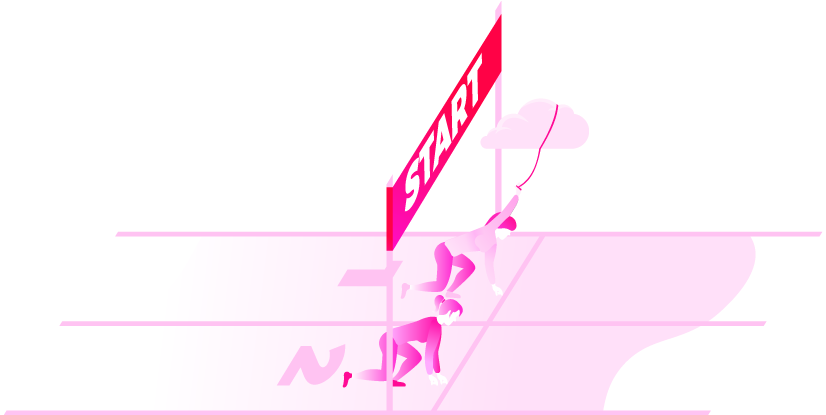Think fast: what are your best skills?
Most of us come up with something concrete – we’re great at ultimate frisbee, we can cook a fantastic apple pie, or we know our way around a spreadsheet.
Those are all excellent, but chances are, you’re overlooking an entire set of traits that are just as important.
If you haven’t heard of soft skills before, you’re in for a life-changing lesson! They’re critical to getting a head start at work, and you can use them to improve your career prospects, job offers, or even to earn a bigger salary.
In this resource guide, you’ll learn the basics of soft skills, how they work, and how you can make them work for you.
Let’s jump in!
What are soft skills?

Before we can talk about soft skills in any depth, let’s figure this out.
What exactly is a soft skill? The answer is easy, but the definition is complex.
What are soft skills vs hard skills?
The dictionary defines soft skills as valuable workplace traits that include “common sense, the ability to deal with people, and a positive flexible attitude.”
That’s better than nothing, but it’s a little broad and ambiguous. What does a “positive flexible attitude” even mean?
This explanation might provide more clarity – think of all the skills you need to land an excellent job: writing great reports, turning work in on time, deftly handling company politics, understanding your department’s budget and solving the occasional computer glitch.
Now, think of those skills in this way:
A soft skill is a skill that you need in the workplace, but isn’t offered as a class at your local college.
A class on writing reports? Check.
Same for reading budgets and basic computer knowledge. Those are called hard skills, and they’re easy to learn and improve.
But there’s no “Company Politics 101” and you’ll struggle to find a class on turning work in on time.
These are soft skills, and while few schools teach them, they’re just as necessary for workplace success.
If you’re still a little fuzzy on the definition, let’s look at an example in the workplace.
Soft skills example: How do soft skills make me a better employee?

Imagine two recent college graduates named Keisha and Sarah. They both just landed jobs managing social media for a large clothing brand.
The official workday is 9 a.m. to 5 p.m., but Keisha walks through the office doors at 8:50 a.m., says “Hi” to a few coworkers and is in her seat at 9 a.m.
Sarah rushes in at 9:03 a.m., narrowly missing a collision between her boss and the coffee in her hand. She opens her email, gets distracted and spends the first 45 minutes browsing a competing company’s summer clothing line – she tells herself it’s to gain a “competitive advantage”.
Keisha knows her most productive hours are from 9 to 11, so she gets started on her most important tasks first – they’re on a list she made yesterday evening.
Keisha and Sarah encounter angry customers on a regular basis and today is no exception. This buyer seems dissatisfied with a purchase and Sarah marks the order for a refund, according to company policy.
But Keisha notices that the customer didn’t complain about the clothes. She calls the buyer, resolves a minor shipping issue and wins back her loyalty. By the end of the call, the formerly disgruntled customer raves about the company’s customer service and promises to place an even bigger order next time.
When the afternoon comes around, Sarah hits a slump of exhaustion and sneaks onto her personal Facebook. Social media is her job, isn’t it?
Keisha’s energy is lagging, too. She turns off her computer, reads a few articles from an industry trade journal and snacks on almonds she brought. Thirty minutes later, she’s back at her biggest tasks of the day.
Sarah is still looking at her cousin’s wedding photos.
At 4:30 p.m., Keisha reviews a monthly report due tomorrow. She finished the paper yesterday but wants to double-check the facts. Everything looks good, so she sends it to Sarah for her data.
Panicked, Sarah realizes she completely forgot about the report. She copies a few statistics from last month’s meeting, explains that things are about the same this month and calls it done. She shuts off her computer at 4:45 p.m., chats with co-workers and heads out a few minutes before five.
Keisha prepares her speaking notes for tomorrow’s meeting, writes down the most important tasks for tomorrow morning and leaves the office at 5:04 p.m.
On paper, Keisha and Sarah are equally qualified. They have the same hard skills, same work experience, same job title and work about the same number of hours.
That said, Keisha is a far better employee.
Or at least, she looks like one. But you may be wondering – do her soft skills make a difference for her? Or better yet, how will having soft skills help you in the real world? We’re glad you asked.
Why are soft skills important in the workplace?
Soft skills matter a lot in the workplace. Here’s why.
As the workforce grows more dependent on knowledge workers, companies are beginning to see the value in soft skills.
Fortune 500 companies regularly train employees in soft skills, and multinational corporations, such as McDonald’s, are launching national campaigns to educate workers on them.
For these employers, the value of soft skills is clear. When employees don’t have them, it costs companies money – lots of money.
Take this example of a call center that had absenteeism problems. Workers were missing nine percent of the time – well above the industry average of five percent or less. With 200 call center employees, working 220 days per year, solving this problem is worth $176,000 annually.
More broadly, a meta-analysis of multiple studies showed that for every $1,100 invested in soft skills training, companies receive a return on investment (ROI) of $4,000.

So needless to say, bringing soft skills to the table from the start is a surefire way to land and keep a job.
Let’s look back to our story of Sarah and Keisha to see how their soft skills affected their careers.
After a year, Keisha and Sarah learn that the clothing brand they work for has decided to cut staff and one of the social media managers will be laid off.
To management, the decision is obvious.
According to the customer database, buyers who receive a response from Keisha rate her responses as “helpful” 93 percent of the time. Even more importantly, they spend an average of $120 more than the baseline customer over the course of three months.
Sarah’s track record doesn’t compare. She only receives a “helpful” rating 78 percent of the time and 27 percent of the customers she works with never purchase from the company again.
Neither of these findings is surprising, considering the job involves dealing with complaints and angry customers. However, Sarah isn’t being compared with the status quo. She’s being compared to Keisha, who goes above it.
Sarah finds a similar job at another company and puts in the required hours. Five years later, she’s still a social media manager with the same salary and she’s still arriving to work at 9:03 a.m. every day.

While Sarah stagnates as a glorified customer service rep, management promotes Keisha to the position of Assistant Marketing Director. She doubles her salary and turns down job offers from competing companies a few times a month.
At this point you may be asking yourself: how do I figure out what soft skills I already have? We’re glad you’re wondering because that’s exactly what we’re going to help you do now.
How do I determine my strongest soft skills?
What are considered soft skills, exactly? And which are most important?
Let’s start by going over the five types of soft skills.
Types of soft skills
While there are an infinite number of soft skills we could list (and we do), they fall into a few distinct categories, according to U.S. News and World Report.
Here they are.
Collaboration
All businesses are made up of individuals. Being able to form bonds with others in the company is an important skill in building a strong team. Besides, research has shown that teams that work well together get more done.

Soft skills in this category include:
- Teamwork – working productively with peers and coworkers
- Personality – encouraging others with a positive attitude
- Social skills – handling yourself well in all types of business situations
- Conflict resolution – de-escalating disagreements between others
Communication and interpersonal skills
No matter what a job entails, it’s essential to have excellent communication skills. If you can present ideas in a logical manner and are well-received, you have a serious advantage over others.

Soft skills in this category include:
- Speaking – delivering impactful speeches in small or large groups
- Listening – understanding and empathizing with others’ points-of-view
- Selling – presenting compelling reasons for taking all kinds of action (not just buying!)
- Persuading – convincing someone to adopt a new viewpoint
Problem solving
If you excel at thinking outside the box, you probably have excellent critical thinking skills. These qualities are important in today’s information economy, where machines and software are quickly replacing humans for rote tasks. Being able to solve problems will prove useful in any sector.

Soft skills in this category include:
- Creativity – imagining new approaches to a problem
- Critical thinking – developing and using a systematized method to handle tasks
- Analysis – interpreting deeper meaning from surface-level data
- Innovation – developing new and original products, services and systems
Time management
No matter how qualified you are to do a job, it only matters if you have the skills to take the job to completion. In fact, 85 percent of managers reported work ethic as the most important factor in employee success. If you work hard, accomplish goals on a deadline and do a job efficiently, you’ll always be employed.

Soft skills in this category include:
- Punctuality and reliability – showing up on time, every time
- Organization – developing and maintaining a logical system for storing items
- Planning – arranging steps to meet long-term goals
- Productivity – managing energy and attention to accomplish more
Leadership
Employers desperately need quality leaders. In fact, a recent survey showed that leadership is the single most urgent talent gap managers face. And don’t think leadership skills only apply if you’re in a management position. Managers need leaders in all roles.

Soft skills in this category include:
- Trustworthiness – being truthful and following through with promises
- Motivation – inspiring others to reach their potential
- Commitment – dedicating yourself to stick with a project
- Goal-setting – developing ambitious, but achievable, long-term goals
How to list soft skills on a resume

So, what skills do you possess?
First, review the list above and notice if any stand out to you. If a particular trait jumps out, it could be because you possess it.
If nothing seems particularly relevant from the samples above, check out this massive list of 140+ soft skills from The Balance.
Second, think back to compliments you’ve received over the years. If you were to ask a family member or friend for their opinion, what would they say?
Finally, look at your history. What jobs have you taken? Which classes interested you the most? What hobbies do you do for fun?
And if that doesn’t help, consider using one of the resources below to discover your soft skills strengths and weaknesses.
Resources:
If you’d like an extra edge, check out our list of the most helpful soft skills interview questions and answers to help you prepare some polished and professional responses to impress employers.
How to develop soft skills?

By this point, you’ve learned that soft skills are critical to getting and keeping a job. And you have some idea of what soft skills you have and lack. But how do you get those qualities? Are you born with soft skills and that’s it?
Fortunately, no. You can develop any soft skill your heart desires. Here’s how.
Step 1: Prioritize which skills to develop
Before you can improve, you need to know which skills you lack.
A simple and effective way to find your weaknesses is to simply ask others who know you.
To get their honest feedback, ask them to take this Insight quiz. Based on their responses and your response about yourself, it calculates your level of self-awareness (or your assessment of yourself compared to others) and sends you the results.
If you’re still unsure, start by making a list of your most desired soft skills. A great place to start is this comprehensive list by LinkedIn (or this list on LifeHack).
The top 10 most desired soft skills, according to LinkedIn are (its category is in parentheses):
- Communication
- Organization (time management)
- Teamwork (collaboration)
- Always punctual (time management)
- Critical thinking (problem solving)
- Social skills (collaboration)
- Creativity (problem solving)
- Interpersonal communication
- Adaptability (leadership)
- Friendly personality (collaboration)
Once you decide what skills to focus on, set aside time to improve.
Step 2: Dedicate time to improving
Just like you should continue to learn hard skills that apply to your job (like better marketing tactics or an understanding of financial statements), you should also make steady progress on your soft skills.
In fact, some experts say that you can reach an impressive level of competency in a topic by putting in just 20 hours of deliberate practice.
So if you work on your soft skills for just five minutes per day, you’ll reach those 20 hours in one short year – not counting weekends and two weeks of vacation.
Finally, it’s time to get to work.
Step 3: Find resources for studying
Just like a hard skill, you can learn a soft skill through study, practice and application.
But how should you study?
Gone are the days when you had to pore over a dry textbook to learn something new. With today’s technology, you can get the best advice from the world’s premier experts on any given topic – in a variety of formats.
A few free resources you’ll find helpful include:
- Podcasts. You can find podcasts on almost any topic imaginable, including instruction on how to develop any soft skill. Most podcasts have a guest speaker who provides unique insight, plus analysis and content from the host.
- Blog articles. The blogosphere is full of how-to advice. Look, in particular, for in-depth guides with research – anyone can post their thoughts on the internet, but high-quality writers will provide data to support their claims.
- Online videos. To see soft skills in action, watch a video! You can find instructors from around the world on YouTube, Vimeo and other sites. Unlike reading or listening, you can learn by observation.
But free content tends to lack comprehensive detail. For even more depth, consider these paid resources:
- Curated content. If you want an expert to help you decide what to focus on, consider curated content. These are ongoing subscriptions or memberships, and you’ll usually get a new topic every week or month for as long as you stay a member.
- Online courses. Unlike curated content, courses have a start and end time, and you can either follow a dictated timeline or finish at your own pace. The best ones combine video and other media to teach one specific skill and usually are broken down into separate lessons. This multimedia format has been proven to increase comprehension.
- Books. Perhaps the oldest way to learn a new skill, books provide a tremendous amount of research you won’t find anywhere else. Look for more recent publications (or even digital titles), since business culture and technology etiquette changes rapidly.
Step 4: Practice intelligently
No matter what skill you want to improve, you can put your newfound knowledge to use with practice.
For maximum practice, you need a few key components:
- Reaching and repeating. Try a new technique that challenges your current level of understanding – then repeat often. For example, experiment with a new data analysis strategy on each spreadsheet you review for an entire week.
- Engagement. Make sure you trim the practice down to stay interested. For example, if you’re struggling with a compelling conclusion to a presentation, practice just the conclusion – not the rest of the speech.
- Purposefulness. Practice in a way that directly relates to your weak area. For example, if you struggle with speaking to large groups, practice speaking in smaller groups rather than just rehearsing on your own.
- Strong, speedy feedback. Get someone to review your skills and provide areas for improvement as often as possible. For example, have your mentor give you leadership feedback verbally right after a meeting, instead of by email the next day.
Over time, this type of active practice will show measurable improvements in your soft skills.
And since soft skills predict your success in life, it’s an investment that will last years to come.